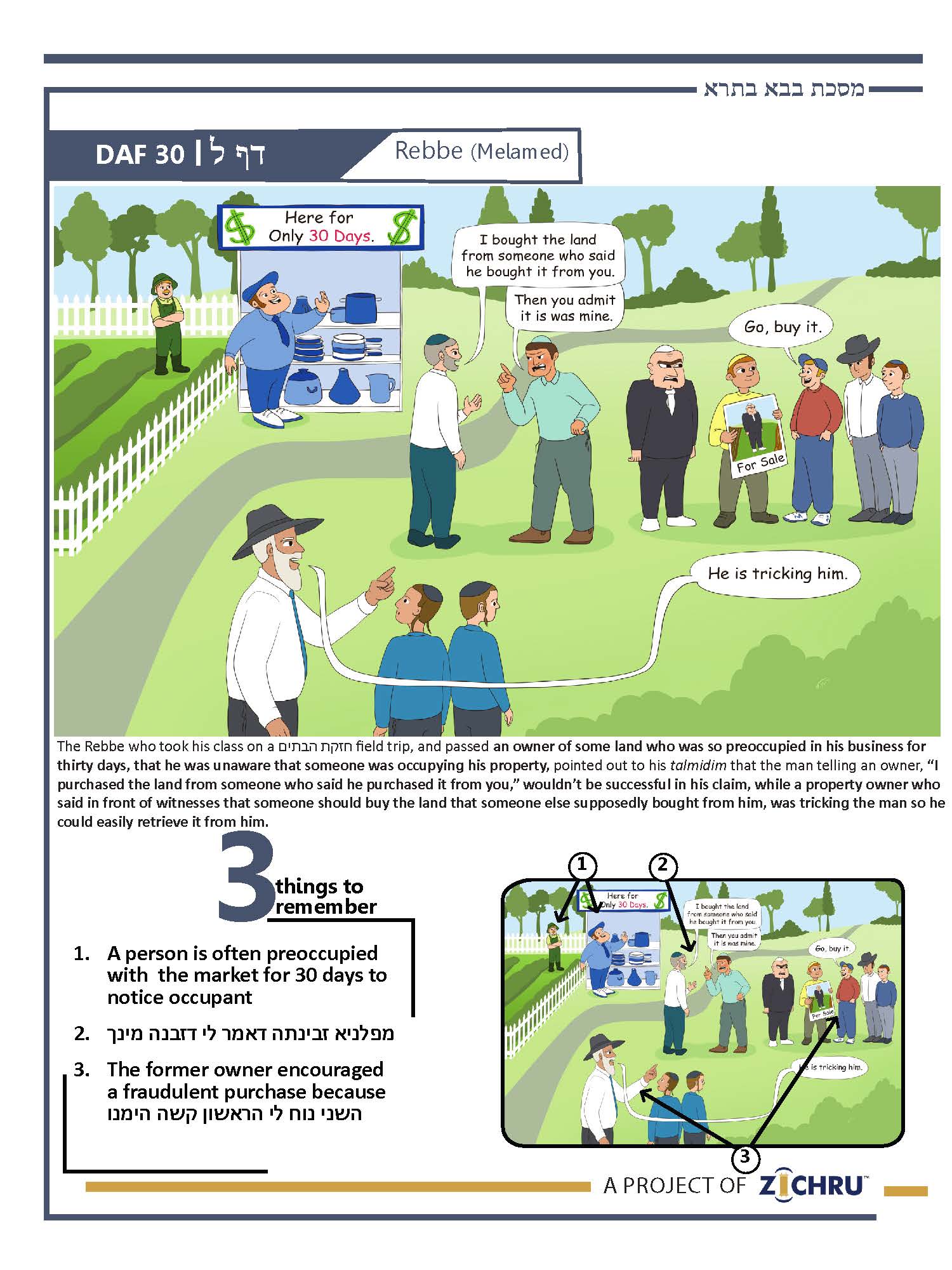Bava Basra - Daf 30
- Audio Timestamps
0:00 - The 3 Sugyos
2:36 - Review of 3 Sugyos
5:05- Siman
7:46 - 4 Blatt Back Chazarah
16:03 - Pop Quiz (Last 7 blatt)
For access to all Zichru resources including PDFs, and illustrations CLICK HERE
- שוקי בראי
Someone challenged a person occupying a house which was formerly his, and the occupant responded, “I bought it from you, and established a chazakah by using it for three years.” The first owner countered: בשוקי בראי הואי – “I was in faraway markets during the three years (where news from this town does not reach), and was unaware that you were occupying my property, so I did not protest.” However, the occupant told the former owner that there are witnesses who could testify that he returned every year for thirty days, and certainly became aware of the occupancy, and should have protested during that final month. The original owner replied: תלתין יומי בשוקאי הוה טרידנא – “The entire thirty days, I was preoccupied with my market business, and never discovered your occupancy.” Rava ruled: עביד איניש דכל תלתין יומי טריד בשוקא – a person often is preoccupied with the market for a full thirty days, and his claim is credible.
- מפלניא זבינתה דאמר לי דזבנה מינך
Someone challenged a person occupying a property which was formerly his, and the occupant said: מפלניא זבינתה דאמר לי דזבנה מינך – “I purchased it from Ploni, who told me he purchased it from you.” The former owner replied: את לאו קא מודית דהאי ארעא דידי היא – “Do you not admit that this land was once mine, ואת לא זבינתה מינאי – and you did not purchase it from me (nor could you claim to have done so, since you have no שטר or chazakah to support that claim)? זיל לאו בעל דברים דידי את – Go out of the property, you are not my litigant!” Rava ruled that the original owner is correct. The Rashbam explains that although he did not have witnesses that the property was ever his, the occupant’s admission is sufficient evidence that it was. Although the occupant had a שטר proving that he purchased the property from the middle person, it does not prove his ownership, since there is no evidence that his seller owned it. Therefore, even if the occupant was there for three years, his chazakah would be ineffective, as a חזקה שאין עמה טענה – chazakah without a viable claim to ownership.
- The former owner encouraged a fraudulent purchase because השני נוח לי הראשון קשה הימנו
In another incident, an occupant told a former owner he had bought the land from Ploni, and also occupied the land for three years. The challenger responded that Ploni is a robber who never owned the land, and the occupant countered: והא אית לי סהדי דאתאי אימלכי בך – “But I have witnesses to testify that I came to ask you about purchasing the land from Ploni, ואמרת לי זיל זבין – and you told me, ‘Go, buy it,’ proving that he did acquire the land from you!” The challenger replied: השני נוח לי – “The second one (you) is easy for me to litigate against in court; הראשון קשה הימנו – the first one (Ploni) is more difficult than he.” Thus, he tricked the occupant into “purchasing” the property from Ploni, to ease the retrieval of his property. Rava ruled that the owner’s claim is credible. In a case where someone signs as a witness on a purchase, Tannaim argue if the signing amounts to an admission that he did not own the land being sold, or if he can make the above claim. The Gemara explains that this may be specific to an action, like signing, but here, where he merely advised the purchaser verbally, עביד איניש דמיקרי ואמר – a person will occasionally say something which appears to undermine his ownership.
Siman – Rebbe (Melamed)
The Rebbe who took his class on a חזקת הבתים field trip, and passed an owner of some land who was so preoccupied in his business for thirty days, that he was unaware that someone was occupying his property, pointed out to his talmidim that the man telling an owner, “I purchased the land from someone who said he purchased it from you,” wouldn’t be successful in his claim, while a property owner who said in front of witnesses that Ploni should buy the land that someone else supposedly bought from him, was tricking the man so he could easily retrieve it from him.


